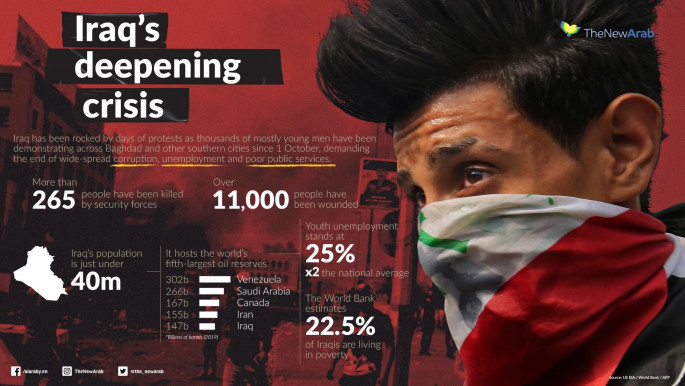Bomb kills at least one near protest camp in Baghdad
In a statement distributed to journalists, the security forces said the blast went off near Tahrir Square, which has been occupied for three weeks by demonstrators demanding regime change.
Earlier on Friday, Iraq's top Shia cleric gave a major boost to the anti-government protests with his most emphatic endorsement to date.
Grand Ayatollah Ali Sistani cautiously backed the protests when they began but has since firmed up his support, describing protests on Friday as "the honourable way" to seek change.
"If those in power think that they can evade the benefits of real reform by stalling and procrastination, they are delusional," Sistani said in his weekly sermon, delivered by a representative in the Shia holy city of Karbala.
"What comes after these protests will not be the same as before, and they should be aware of that."
The 89-year-old cleric, who is based in the Shia holy city of Najaf and never appears in public, remains hugely influential in the Shia-majority south.
 |
| Click here to enlarge |
Shortly after his sermon, demonstrators hit the street in Najaf.
Thousands also rallied in the southern hotspots of Kut, Hilla, Nasiriyah and Diwaniyah, according to local reports.
And in the port city of Basra, protesters blocked cargo trucks from accessing Umm Qasr port, the main entry point for food and medical imports into Iraq.
Security forces had ended a sit-in there a week ago but a group of about 20 men cut the road again on Friday.
In Tahrir, crowds held their ground after hearing the Shia religious leadership, or "marjaiyah".
"No one retreat, even the marjaiyah is with us!" said one young man as security forces pelted demonstrators with tear gas canisters.
In neighbouring Khallani Square, two protesters were shot dead on Friday afternoon, according to a medical source, after one was killed the previous night.
A third protester was killed in the square later by a tear gas cannister, the same source said.
More than 330 people have died since the rallies erupted, making them the deadliest grassroots movement to hit Iraq in years.
They present the biggest threat so far to the political system ushered in by the US-led invasion which toppled the regime of longtime dictator Saddam Hussein in 2003.
Protesters blame that system for rampant corruption, staggering unemployment rates and poor services in resource-rich Iraq, OPEC's second-biggest producer.
Agencies contributed to this report.
Follow us on Twitter and Instagram to stay connected





 Follow the Middle East's top stories in English at The New Arab on Google News
Follow the Middle East's top stories in English at The New Arab on Google News
![Netanyahu furiously denounced the ICC [Getty]](/sites/default/files/styles/image_330x185/public/2024-11/GettyImages-2169352575.jpg?h=199d8c1f&itok=-vRiruf5)
![Both Hamas and the Palestinian Authority welcomed the ICC arrest warrants [Getty]](/sites/default/files/styles/image_330x185/public/2024-11/GettyImages-2178351173.jpg?h=199d8c1f&itok=TV858iVg)
